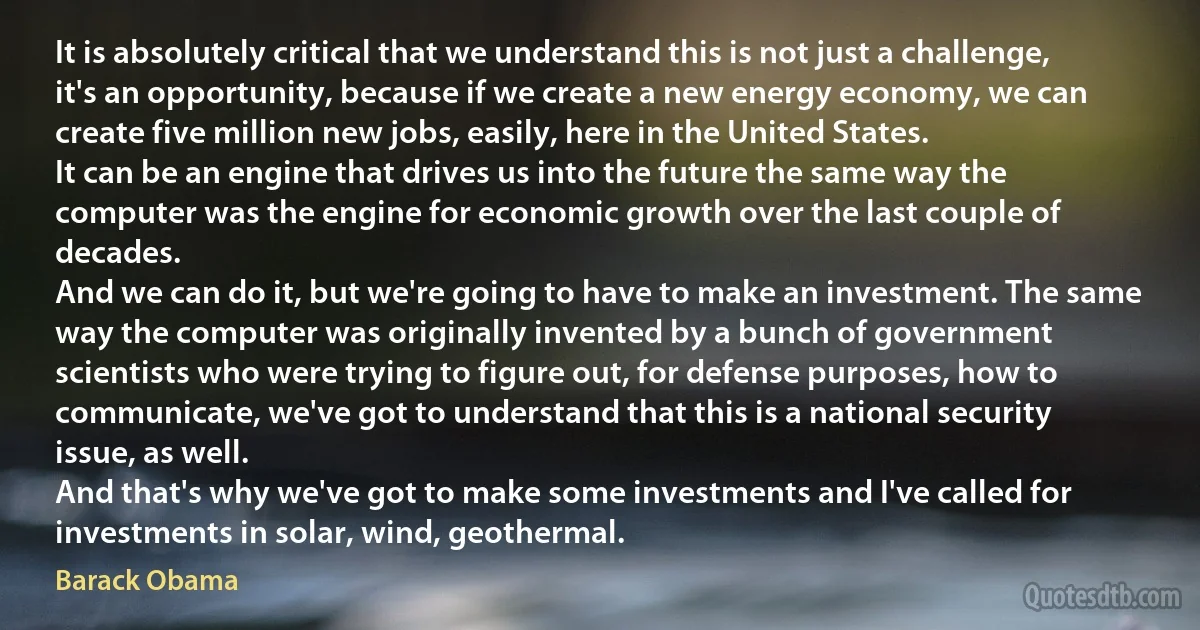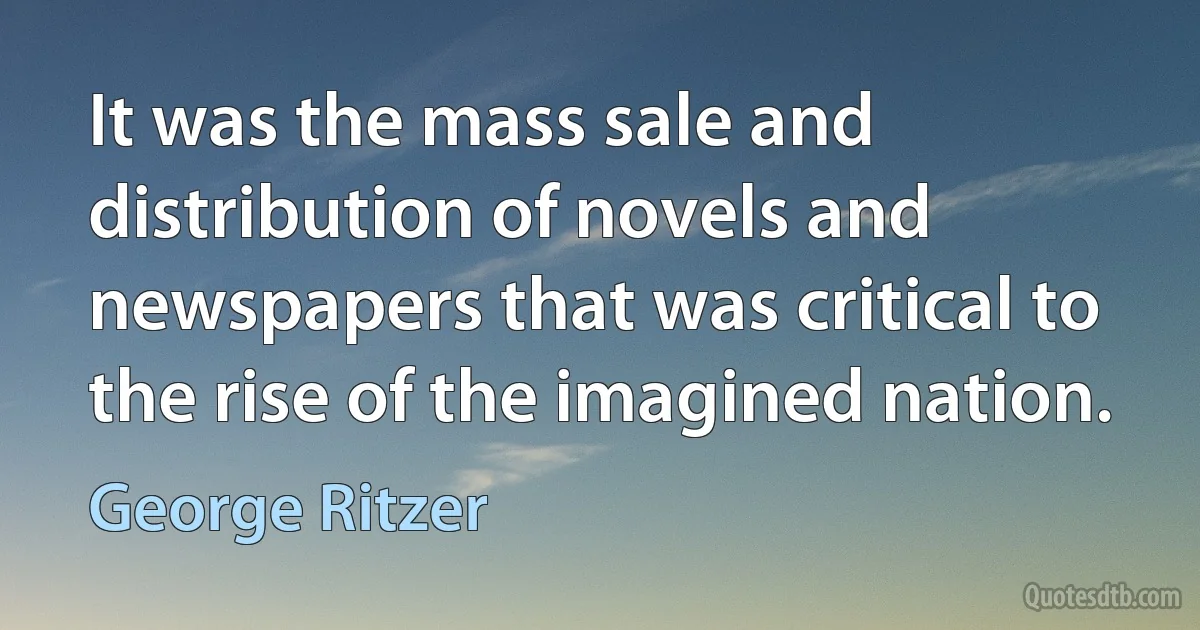Critical Quotes - page 19
Christianity has functioned for the normative self-understanding of modernity as more than a mere precursor or a catalyst. Egalitarian universalism, from which sprang the ideas of freedom and social solidarity, of an antonomous conduct of life and emancipation, of the individual morality of conscience, human rights, and democracy, is the direct heir to the judaic ethic of justice and the Christian ethic of love. This legacy, substantially unchanged, has been the object of continual critical appropriation and reinterpretation. To this day, there is no alternative to it. And in the light of the current challenges of a postnational constellation, we continue to draw on the substance of this heritage. Everything else is just idle postmodern talk.

Jürgen Habermas
Existential envy which is directed against the other person's very nature, is the strongest source of ressentiment. It is as if it whispers continually: "I can forgive everything, but not that you are- that you are what you are-that I am not what you are-indeed that I am not you.” This form of envy strips the opponent of his very existence, for this existence as such is felt to be a "pressure,” a "reproach,” and an unbearable humiliation. In the lives of great men there are always critical periods of instability, in which they alternately envy and try to love those whose merits they cannot but esteem. Only gradually, one of these attitudes will predominate. Here lies the meaning of Goethe's reflection that "against another's great merits, there is no remedy but love.”.

Max Scheler
One of the main focuses of my training sessions is to help individuals find their unique voices in the learning process. We all have our strengths, our weaknesses, our styles of learning, our personalities. Developing introspective sensitivity to these issues is critical to long-term success.

Joshua Waitzkin
No criticism can be brought against a branch of technical science from outside; no thought fitted out with the knowledge of a period and setting its course by definite historical aims could have anything to say to the specialist. Such thought and the critical, dialectical element it communicates to the process of cognition, thereby maintaining conscious connection between that process and historical life, do not exist for empiricism; nor do the associated categories, such as the distinction between essence and appearance, identity in change, and rationality of ends, indeed, the concept of man, of personality, even of society and class taken in the sense that presupposes specific viewpoints and directions of interest.

Max Horkheimer
The outlook of a Bruno, a Kepler, or a Galileo is determined by the idea of a comprehensive, all-embracing unity of the physical world. The same law governs the courses of the stars, the falling of stones, and the flight of birds. This homogenization of the physical world with respect to the validity of law deprives the division of physical objects into rigid abstractly defined classes of the critical significance it had for Aristotelian physics, in which membership in a certain conceptual class was considered to determine the physical nature of an object.

Kurt Lewin
Without any coherent national organisation to repel from the land on which they had settled the ever-unknowable descents from the seas, the Saxons, now for four centuries entitled to be deemed the owners of the soil, very nearly succumbed completely to the Danish inroads. That they did not was due--as almost every critical turn of historic fortune has been due--to the sudden apparition in an era of confusion and decay of one of the great figures of history.

Winston Churchill
Apparently the rise of consciousness is linked to certain kinds of privation. It is the bitterness of self-consciousness that we knowers know best. Critical of the illusions that sustained mankind in earlier times, this self-consciousness of ours does little to sustain us now. The question is: which is disenchanted, the world itself or the consciousness we have of it?

Saul Bellow
No matter where and how far we look, nowhere do we find a contradiction between religion and natural science. On the contrary, we find a complete concordance in the very points of decisive importance. Religion and natural science do not exclude each other, as many contemporaries of ours would believe or fear. They mutually supplement and condition each other. The most immediate proof of the compatibility of religion and natural science, even under the most thorough critical scrutiny, is the historical fact that the very greatest natural scientists of all times-men such as Kepler, Newton, Leibniz-were permeated by a most profound religious attitude.

Max Planck
I think that the polls taken in Baghdad explain it very well, they seem to understand. The United States invaded Iraq to gain control of one of the major sources of the world's energy, right in the heart of the world's energy producing regions. To create, if they can, a dependent client state. To have permanent military bases. And to gain what's called "critical leverage” - I'm quoting Zbigniew Brzezinski - to gain critical leverage over rivals, the European and Asian economies. It's been understood since the Second World War, that if you have your hand on that spigot, the main source of the world's energy, you have what early planners called "veto power” over others. Iraq is also the last part of the world where there are vast, untapped, easily accessible energy resources. And you can be sure that they want the profits from that to go primarily to U. S.-based multinationals and back to the U. S. Treasury, not to rivals. There are plenty of reasons for invading Iraq.

Noam Chomsky
For as soon as the distribution of labour comes into being, each man has a particular exclusive sphere of activity, which is forced upon him and from which he cannot escape. He is a hunter, a fisherman, a shepherd, or a critical critic and must remain so if he does not wish to lose his means of livelihood; while in communist society, where nobody has one exclusive sphere of activity but each can become accomplished in any branch he wishes, society regulates the general production and thus makes it possible for me to do one thing today and another tomorrow, to hunt in the morning, to fish in the afternoon, rear cattle in the evening, criticize after dinner, just as I have in mind, without ever becoming hunter, fisherman, shepherd or critic.

Karl Marx
Feuerbach is the only one who has a serious, critical attitude to the Hegelian dialectic and who has made genuine discoveries in this field. He is in fact the true conqueror of the old philosophy. The extent of his achievement, and the unpretentious simplicity with which he, Feuerbach, gives it to the world, stand in striking contrast to the opposite attitude (of the others). Feuerbach's great achievement is: (1) The proof that philosophy is nothing else but religion rendered into thought and expounded by thought, i.e., another form and manner of existence of the estrangement of the essence of man; hence equally to be condemned;(2) The establishment of true materialism and of real science, by making the social relationship of "man to man” the basic principle of the theory; (3) His opposing of the negation of the negation, which claims to be the absolute positive, the self-supporting positive, positively based on itself.

Karl Marx
Many people think that the progress of the human race is based on experiences of an empirical, critical nature, but I say that true knowledge is to be had only through a philosophy of deduction. For it is intuition that improves the world, not just following a trodden path of thought. Intuition makes us look at unrelated facts and then think about them until they can all be brought under one law. To look for related facts means holding onto what one has instead of searching for new facts. Intuition is the father of new knowledge, while empiricism is nothing but an accumulation of old knowledge. Intuition, not intellect, is the 'open sesame' of yourself.

Albert Einstein
No country can possibly move ahead, no free society can possibly be sustained, unless it has an educated citizenry whose qualities of mind and heart permit it to take part in the complicated and increasingly sophisticated decisions that pour not only upon the President and upon the Congress, but upon all the citizens who exercise the ultimate power...Quite obviously, there is a higher purpose, and that is the hope that you will turn to the service of the State the scholarship, the education, the qualities which society has helped develop in you; that you will render on the community level, or on the state level, or on the national level, or render on the community level, or on the state level, or on the national level, or the international level a contribution to the maintenance of freedom and peace and the security of our country and those associated with it in a most critical time.

John F. Kennedy
While the so-called religious issue is necessarily and properly the chief topic here tonight, I want to emphasize from the outset that we have far more critical issues to face in the 1960 election; the spread of Communist influence, until it now festers 90 miles off the coast of Florida - the humiliating treatment of our President and Vice President by those who no longer respect our power - the hungry children I saw in West Virginia, the old people who cannot pay their doctor bills, the families forced to give up their farms - an America with too many slums, with too few schools, and too late to the moon and outer space. These are the real issues which should decide this campaign. And they are not religious issues - for war and hunger and ignorance and despair know no religious barriers.

John F. Kennedy
Love when felt at all deeply has an element of transcendentalism in it, which makes it the most natural thing in the world for the two lovers - even though drawn together by a passing sex-attraction - to swear eternal troth to each other; but there is something quite diabolic and mephistophelean in the practice of the Law, which creeping up behind, as it were, at this critical moment, and overhearing the two thus pledging themselves, claps its book together with a triumphant bang, and exclaims: "There now you are married and done for, for the rest of your natural lives."

Edward Carpenter



